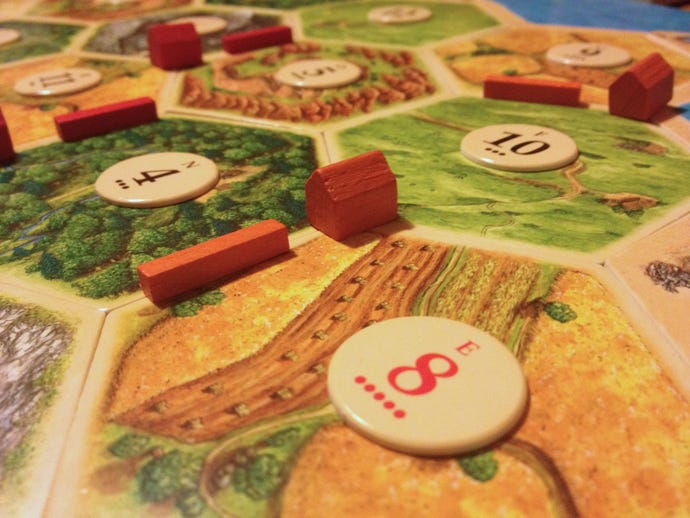What are the Best Board Games for Beginners - That are Also Great for Advanced Players
Looking to put down your controller and pick up some cards or dice instead? Here are the best games to get you started down the rabbit-hole of tabletop gaming.
This article first appeared on USgamer, a partner publication of VG247. Some content, such as this article, has been migrated to VG247 for posterity after USgamer's closure - but it has not been edited or further vetted by the VG247 team.
I'm sure all of us here can agree that video games are great. But sometimes they can be a somewhat solitary, even lonely experience -- particularly if you're not a fan of playing online.
Tabletop gaming, if you've never tried it, is an excellent hobby to add to your free time. It's an inherently social activity, and a fine excuse to gather a few friends, ply them with a tipple of your choice and then prove beyond a doubt how much better you are than them at 13th century German farming. (That's farming in Germany, not literally farming Germans. But you knew that.) There's also a certain degree of crossover in the appeal elements of video games and tabletop games, and a wide variety of the latter available to cater to all tastes.
But where to begin? There are vast quantities of board and card games available nowadays, and it can sometimes be difficult to know what's good and what isn't; what's friendly to new players and what's delightfully complicated.
There are always the old standbys of Monopoly, Clue and Scrabble, but the world of tabletop gaming is a much broader, more interesting place than that in 2014. Enter Team USG, then, with its favorite "gateway" games, designed to get tabletop newcomers and veterans alike gathered around the table to have fun together. As always, we'd love to hear your favorites, too; give 'em a shout out in the comments if you have any that you've had particular success with in the past.
Are you ready? Then let's begin.
Ticket to Ride
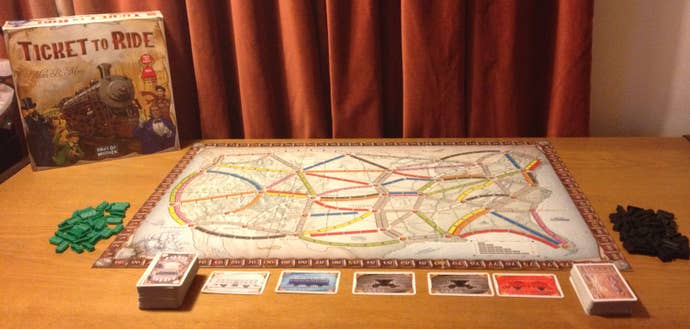
Alan R. Moon's Ticket to Ride series is a range of games ostensibly about trains, but there's no need to be interested in railways at all to enjoy these titles. The theme is little more than a convenient framing device for the games' core mechanic: claiming routes across a map in order to 1) score points and 2) prevent other players from doing the same.
Ticket to Ride is primarily a game about collecting sets of cards in order to claim the aforementioned routes. Each route on the board is one of several different colors and, in most cases, between one and six train carriages in length. You'll need the appropriate number of correctly colored cards in order to claim a route, though gray routes may be claimed with a set of any single color, while rainbow-colored locomotive cards may be used to replace any single card of any color. You score points according to how long the route is, ranging from a single point for a one-train route up to a massive 15 for a six-train route.
At the end of the game, which comes when someone comes close to running out of trains, you receive bonuses or penalties according to whether or not you completed specific routes depicted on cards drawn at the beginning of the game and, optionally, throughout play. Depending on which version of the game you play, there are also other bonuses available for things like having the most completed routes, or the longest unbroken line of trains.
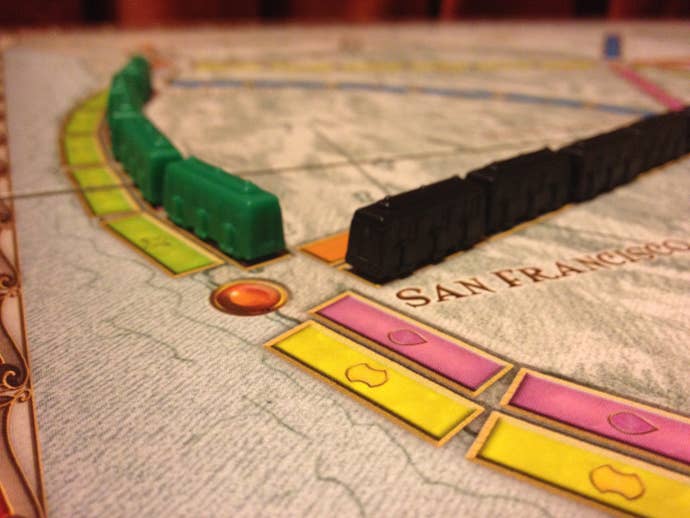
There are a number of different editions of Ticket to Ride available, many of which add small tweaks to the rules or shake up the fomula in some way. The Europe variant, for example, allows you to place stations in order to "borrow" routes claimed by other players, while the Nordic Countries version takes place on a much more cramped board, only allows up to three players and also prevents you from using rainbow locomotive cards as wild cards -- instead, they're used to help claim ferry and tunnel routes. There are also expansion map packs available that aren't complete games in their own right, but which provide alternative settings and rule tweaks for those who already own one of the basic sets.
All versions of Ticket to Ride are very accessible and easy to understand, though you may wish to start with the standard US version (simply called Ticket to Ride) for the simplest, most straightforward rules.
The Settlers of Catan
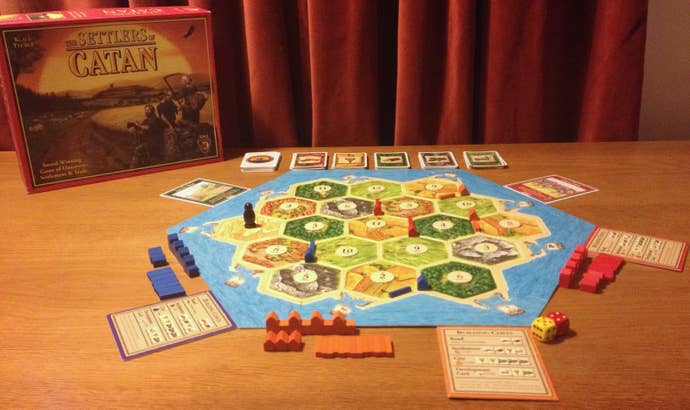
The Settlers of Catan, or simply Catan as it's more commonly known, is a game about building and trading. Taking on the role of an overseer supervising colonization efforts on the virgin island paradise of Catan, it's up to you to gather resources, then use them to build enough roads and settlements to win the game by reaching 10 victory points before your rivals.
Catan's such a fondly regarded game by many tabletop players due to its good balance between randomness and strategy. Each turn, a roll of two dice determines which of the hexagonal areas of the game board, each of which is marked with a number and a type of resource, produces its product. Players with settlements or cities on one of the hex's corners receive cards representing the resources in question -- even if it's not their turn -- and can subsequently use these cards to either trade with other players or construct roads and new settlements, or upgrade settlements into cities.
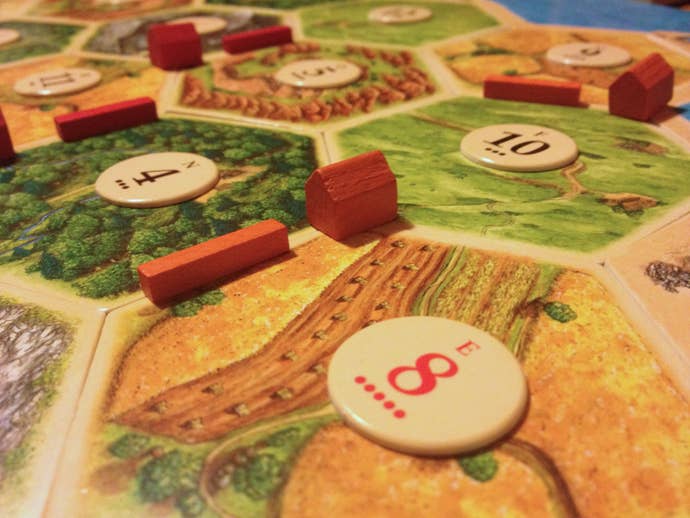
There's a certain degree of being at the mercy of the dice in Catan, but rather than making the game overly frustrating and luck-based, this simply acts to level the playing field between those who are confident in strategic thinking and those who are less experienced with this type of game. This is a game that's high on interaction and negotiation, and is thus both a good icebreaker and a great game to play with a group of close friends.
It's also an excellent introduction into the subset of tabletop games that are collectively referred to as "Eurogames" -- games that are usually by European (often German) designers and which generally have a stronger focus on mechanics and strategy than on theme, and which sometimes take a bit of practice to get completely familiar with. Catan itself is simple to get started with, but it provides a firm grounding in the sorts of mechanics you can expect to see in more complex games -- and if you do want to make the game deeper, there are a number of expansions available that shake up the basic gameplay significantly.
Carcassonne
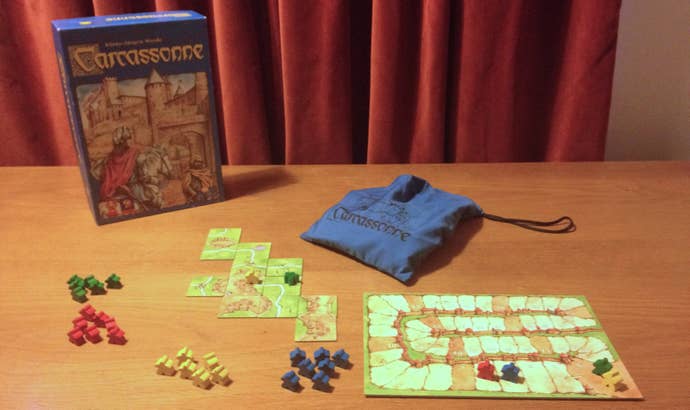
Carcassonne, a game in which you spend a lot of time building roads across the medieval French countryside, may not sound like the most interesting concept for a game, but as you'll discover with many tabletop games, even the most mundane of themes can make for surprisingly compelling entertainment. In Carcassonne's case, the simple premise makes for a highly competitive experience that occasionally descends into outright cut-throat screwing each other over. And it's great.
Carcassonne's mechanics are mostly extremely simple and easy to pick up even for inexperienced tabletop gamers. Each turn, you'll draw a tile from the pool and attach it to the tiles already on the table, ensuring that the features link up appropriately -- roads link to roads, cities link to cities, fields link to fields -- and then, assuming you have any little wooden people (often referred to as "meeples" by board game geeks) left in your stock, you can claim a feature on the tile you just laid. If you complete a feature (by completely enclosing a city, ensuring both ends of a road lead somewhere or completely surrounding a monastery with other tiles) and have a meeple in place, you score points.
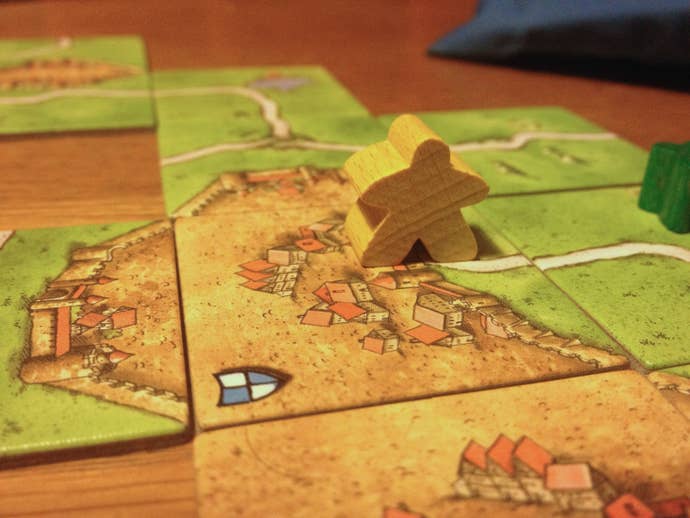
Carcassonne's competitiveness starts to show itself when players realize that despite the fact there are rules forbidding you from claiming a feature another player already has a meeple in, there's nothing stopping you from claiming an unconnected feature, then later joining it up to the other player's feature and forcing them to share the points they thought were theirs alone. Or, if you're feeling particularly vindictive, claiming two unconnected features, joining them up to the other player's claimed feature, outnumbering them and taking all the points for yourself. Particularly nasty players can spot places where they can lay tiles that prevent a feature from ever being completed, essentially forcing their opponents to get through the rest of the game with fewer available meeples.
There's also a rule about lying farmers down in fields that no-one ever understands on their first play through the game -- and the fact that it's changed through the game's various different editions through the years hasn't helped -- but aside from this, Carcassonne is an extremely easy to understand but very enjoyable game suitable for players of all experience levels. And if you find the base game too straightforward, there's a swathe of expansions available to add various new rules and ways to score, plus its tile-based nature means it's very flexible and scalable. Some players even put together multiple sets to play a "mega-game" with hundreds or even thousands of tiles over the course of several hours or days.
King of Tokyo
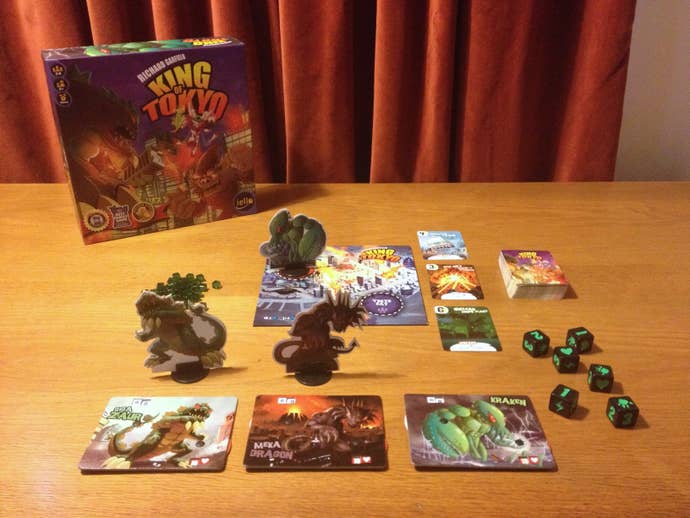
King of Tokyo is a game about rolling dice and pressing your luck, ideally suited for those who like Yahtzee but wish it had more skyscraper-sized monsters punching each other in the face. And yes, it's by the same Richard Garfield who gave the world Magic: The Gathering.
Playing the role of one of several different rather obviously movie-inspired monsters, you'll roll the six dice up to three times on your turn and, like Yahtzee, may "hold" any number of them before rerolling. The combination of symbols you roll determine what you get to do next -- hearts let you heal damage; rolling three or more of the same number scores you that many points; claws let you do damage to the monster currently in Tokyo (if you're outside) or all the monsters outside it (if you're inside); lightning bolts let you acquire energy cubes which may be spent on cards with special abilities. The winner is either the first monster to score 20 points or the last monster standing.
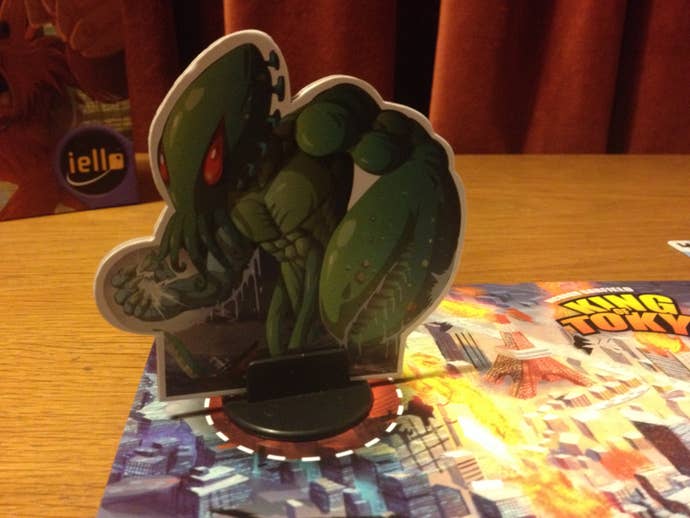
King of Tokyo is a straightforward and easy to understand game, and the way its theme ties in nicely with its mechanics encourages a lot of friendly trash talk and monster impersonations around the game table. It's particularly well suited for family play, since its strong degree of randomness means that anyone around the table has a decent chance of winning regardless of age or experience, and the fact that a single play session is so short means that most groups of players find it difficult to stop at just a single game.
Tsuro: The Game of the Path
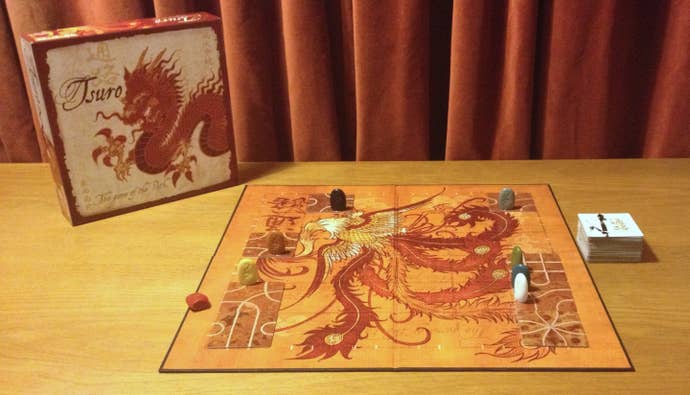
Tsuro's instruction leaflet spouts some guff about dragons and phoenixes and reaching enlightenment, but really this is a simple abstract tile-laying game in which your aim is simply to not fall off the board while attempting to ensure your fellow players fall off the board or crash into each other as quickly as possible.
You achieve this by playing one of the three tiles from your hand to the board into a space adjacent to where your piece is. All pieces have various "paths" depicted on them, and all pieces connect to each other in some way or another. Once you've laid your tile, you then move both your piece and any other pieces that are no longer at the end of a path along until they may go no further. If a piece falls off the edge of the board, it is eliminated. If two pieces crash into each other, they are both eliminated. The last player surviving wins. That's it.
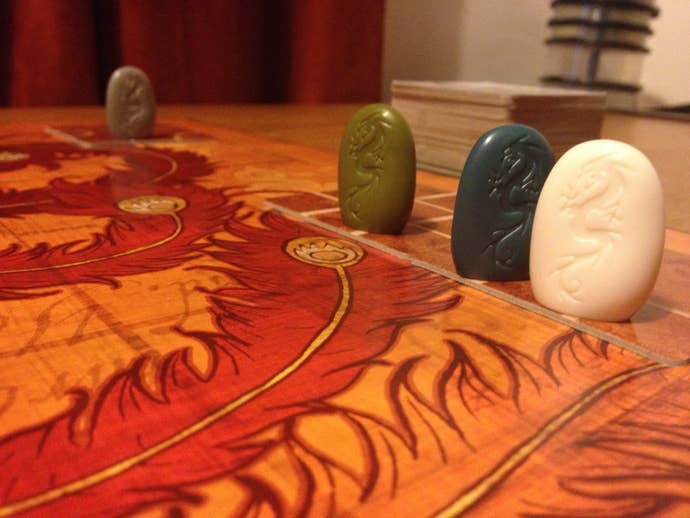
Tsuro's simple rules and abstract design mean it's a very easy game to pick up and play, and with short play sessions it's easy to get several games played in the space of just an hour. The more you play it, the more you realize there's a surprising amount of strategic depth, too; a little forward planning can go a long way in this game, but at the same time you'll need to remember that your opponents are likely making their own crafty schemes to see you eliminated.
Formula D
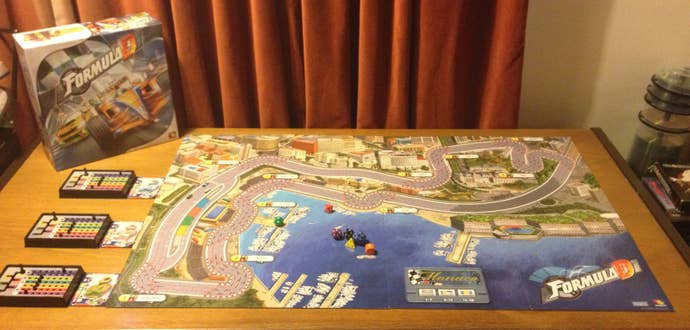
It's quite unfashionable for modern games to adopt a "roll a die and move that many spaces" mechanic -- often referred to simply as "roll and move" -- because it leaves a significant proportion of the game up to chance rather than genuine skill.
Formula D, a board game based around motor racing, makes use of a roll and move system as its core mechanic. But it mitigates a lot of the inherent problems of this system by making use of more than one type of die. Specifically, it has six different dice with varying numbers of sides -- one for each gear of your car. The higher the gear you're in, the higher both your minimum and maximum "speed" (i.e. number of spaces you can move) will be.
It's not simply a case of spending five turns getting into sixth gear -- you can change up one gear per turn -- and then it becoming a simple matter of who rolls the highest, though. No, in order to reflect the more technical aspects of driving -- you know, going around corners and stuff like that -- Formula D requires its drivers to end their turn at least once on each corner; more than once on more complex corners. If you sail through a corner in which you were supposed to stop once, you'll take damage -- the board game equivalent of playing Gran Turismo by holding down the accelerator button and "bumping" your way around the corners -- while if you completely overshoot a corner in which you're supposed to stop more than once, you'll crash and be completely eliminated from the race.
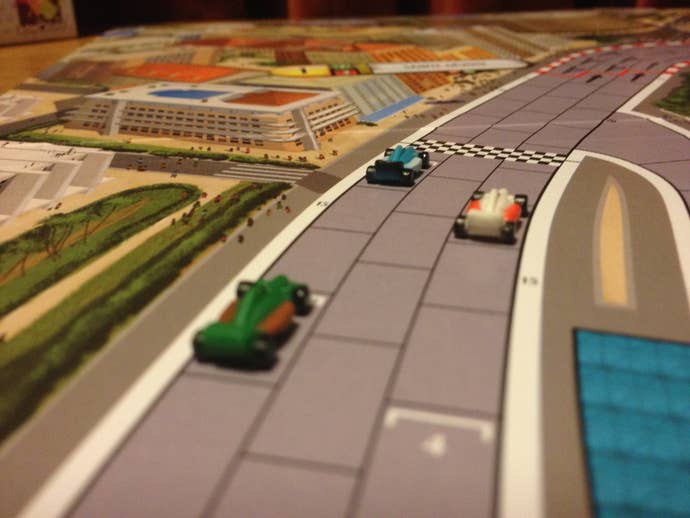
Formula D, then, quickly becomes a matter of determining what the optimum route and gear for each corner is, much like real racing. You're provided with all the information you need in order to work this out, however, and the game's turn-based nature means that even those of us who are completely cack-handed in driving games on computer and console have a chance of doing well here.
Formula D's an easy game to get started with, and it's also expandable in various ways. More advanced players can play a variant of the game in which individual parts of the car have their own damage ratings rather than the whole car having a single pool of hit points, for example, while you can also choose to play with street racing cars, weather conditions, drivers with unique abilities and special powers that can be unleashed at particular points in the race. And on top of that, there's a whole host of new tracks available to give the game a ton of variety.
Blokus
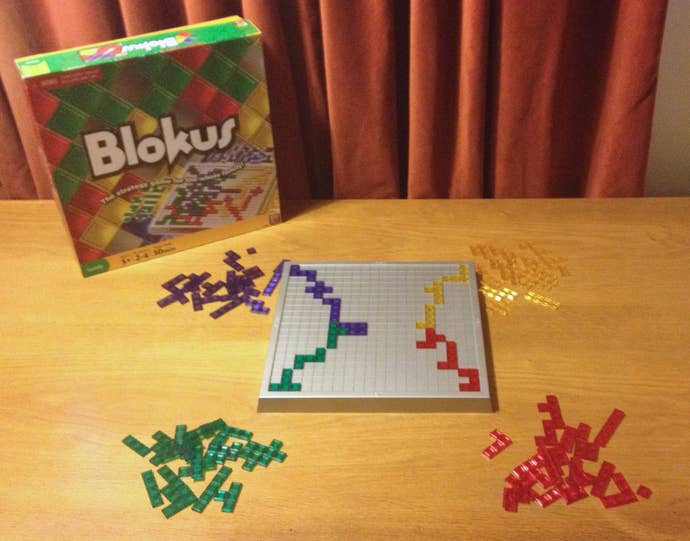
Blokus is an abstract strategy game with a superficial resemblance to Tetris. Between two and four players take it in turns to place one of the 21 tiles from their stock -- each of which is differently shaped, and made up of between one and five squares -- on the board. When placing a new piece, it may only touch the corner of one of your previous pieces, though it may intertwine with other players' pieces as you please. If you can't place a piece, you pass and your role in the game is effectively over.
The game ends when no other players are able to move, at which point whoever has the fewest total number of squares remaining in their stock of tiles is the winner. In the case of no-one having any tiles left, whoever played the single-square tile as their last piece wins.
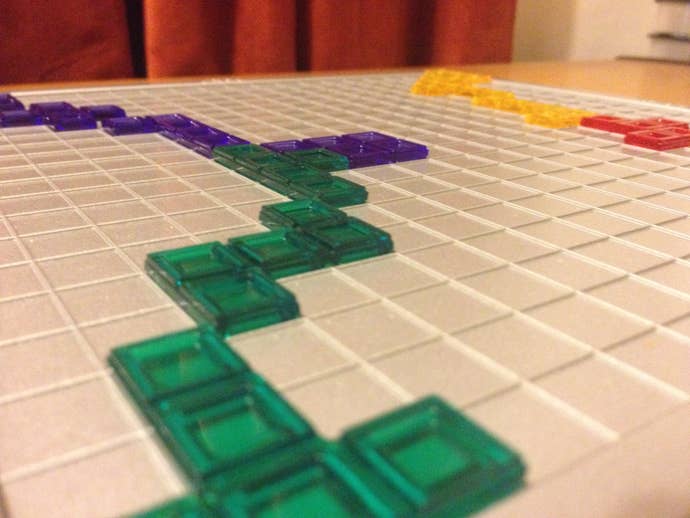
Blokus is a great game that is easy to get started with, but its basic version only really works with four players -- two- and three-player games force you to make use of some rather peculiar rules for having a "dummy" player, or playing two different colors instead of one. Fortunately, for duos who like the idea of the game, the smaller-scale Blokus Duo successfully adapts the game to a one-on-one format, though groups of three are still left out in the cold a bit by this.
